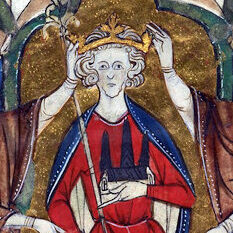1261

Henry’s basic grievance was that the barons had gone beyond the intentions of the Provisions. They had met and acted without him, kept him impoverished while enriching themselves, failed him in his foreign policy pursuits, all undeniably true and lamentable since he, the king, had every desire to rule by the Provisions. His summoning parliament as required by them was the most obvious example of his good faith. Whether chastened or not, the barons were caught off guard as Henry secretly moved to usurp full authority. He secured Dover and the Cinque Ports to ensure the arrival of mercenaries, placed his own men in key positions, and relocated to Winchester, his birthplace, where he subsequently announced that the pope had absolved him of his oath to observe the Provisions. The barons united again under Gloucester and Simon, but they could no longer count on Edward’s support. At first the heir refused to accept the absolution for himself, but was eventually won over by his mother. He also arrived with William de Valence, the hated Lusignan whose deportation had been the groundwork for the original Provisions, then left again for Gascony after his uncle was restored to favor. But Henry’s treachery cost him allies too. Hugh Bigod, turned out as castellan in Dover, defected back to the barons and was joined by his half-brother John de Warenne, the only magnate who had refused the initial oath to the Provisions in 1258. The king’s biggest problem, however, was the resistance he faced on a local level. When he attempted to supplant the sheriffs with his own men, Simon saw to it that the barons installed their own rival sheriffs (referred to as “wardens” so as not to create any confusion). He then went abroad to plead their case before Louis, to raise foreign troops, and in what was perhaps his most defiant act, he and Gloucester summoned their own parliament, consisting of local knights, to meet in St. Albans and discuss what to do about the king’s subversion. Henry refused to back down and countered with his own parliament in Windsor. The standoff was broken when Gloucester again deserted to the king, this time bribed by the favors of Queen Eleanor. In a treaty made at Kingston in November 1261, the reformers agreed to renegotiate the Provisions with Richard, the king of the Romans, acting as arbitrator. This clear defeat of the reforming program left Simon disgusted. He departed for France, saying he would rather live in poverty than in perjury.

William’s return was great comfort to a man like Henry, who valued loyalty above all else. As he was preparing to resume absolute authority, the king was blindsided by Boniface of Savoy, the queen’s uncle and archbishop of Canterbury, who called him to account again for his previous exactions from the church. Although incensed by this “diminution of our crown and dignity”, Henry still did Boniface the great favor of letting him hold a weekly market free of charge. He wanted to make sure the unpredictable archbishop held no more surprises for him when it time came to read the papal bull out loud.
John de Warenne, the earl of Surrey, was yet another Marshal grandson and all that was wrong with Henry’s use of patronage. When Warenne’s father died, the king named Peter of Savoy his guardian, then married him at 16 to his half-sister Alice Lusignan, who was seven years older. The marriage of heiresses and royal wards to penniless foreigners was one of the chief causes of resentment against Henry’s rule. Warenne was also typical of English barons of this period given to flip-flopping from one side to the other. He ended up on the winning side but would later be remembered by history as the old man thoroughly thrashed by William Wallace at the Battle of Stirling Bridge.
Henry committed his crown jewels to his sister-in-law Queen Margaret at this time, not so much for their security than as security for his mercenaries. The list included his great crown, three gold combs, 66 girdles, and 208 jeweled rings.